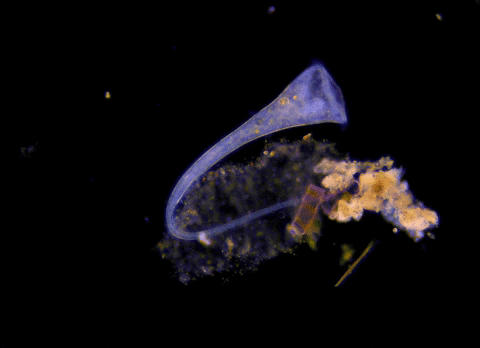CovOps

 Location : Ether-Sphere Location : Ether-Sphere
Job/hobbies : Irrationality Exterminator
Humor : Über Serious
 |  Subject: This Brainless, Single-Celled Blob Can Make Complex 'Decisions' Subject: This Brainless, Single-Celled Blob Can Make Complex 'Decisions'  Sat Dec 07, 2019 12:11 am Sat Dec 07, 2019 12:11 am | |
| Tiny, brainless blobs might be able to make decisions: A single-celled organism can "change its mind" to avoid going near an irritating substance, according to new findings.
Over a century ago, American zoologist Herbert Spencer Jennings conducted an experiment on a relatively large, trumpet-shaped, single-celled organism called Stentor roeselii. When Jennings released an irritating carmine powder around the organisms, he observed that they responded in a predictable pattern, he wrote in his findings, which he published in a text called "Behavior of the Lower Organisms" in 1906.
To avoid the powder, the organism first would try to bend its body around the powder. If that didn't work, the blob would reverse the movement of its cilia — hairlike projections that help it move and feed — to push away the surrounding particles. If that still didn't work, the organism would contract around its point of attachment on a surface to feed. And finally, if all else failed, it would detach from the surface and swim away.

In the decades that followed, however, other experiments failed to replicate these findings, and so they were discredited. But recently, a group of researchers at Harvard University decided to re-create the old experiment as a side project. "It was a completely off-the-books, skunkworks project," senior author Jeremy Gunawardena, a systems biologist at Harvard, said in a statement. "It wasn't anyone's day job."
After a long search, the researchers found a supplier in England who had collected S. roeselii specimens from a golf course pond and had them shipped over to Gunawardena's lab. The team used a microscope to observe and record the behavior of the organisms when the scientists released an irritant nearby.
First, they tried releasing carmine powder, the 21st century organisms weren't irritated like their ancestors were. "Carmine is a natural product of the cochineal beetle, so its composition may have changed since [Jennings'] day," the researchers wrote in the study. So they tried another irritant: microscopic plastic beads.
Sure enough, the S. roeselii started to avoid the beads, using the behaviors that Jennings described. At first, the behaviors didn't seem to be in any particular order. For example, some organisms would bend first, then contract, while others would only contract. But when the scientists did a statistical analysis, they found that there was indeed, on average, a similar order to the organisms' decision-making process: The single-celled blobs almost always chose to bend and alter the direction of their cilia before they contracted or detached and swam away, according to the statement.
What's more, the researchers found that, if the organism did reach the stage of needing to contract or detach, there was an equal chance that they would choose one behavior over the other.
"They do the simple things first, but if you keep stimulating, they 'decide' to try something else," Gunawardena said. "S. roeselii has no brain, but there seems to be some mechanism that, in effect, lets it 'change its mind' once it feels like the irritation has gone on too long."
The findings can help inform cancer research and even change the way we think about our own cells. Rather than being solely "programmed" to do something by our genes, "cells exist in a very complex ecosystem, and they are, in a way, talking and negotiating with each other, responding to signals and making decisions," Gunawardena said. Single-celled organisms, whose ancestors once ruled the ancient world, might be "much more sophisticated than we generally give them credit for," he said.
https://www.livescience.com/single-celled-organisms-decisions.html |
|

